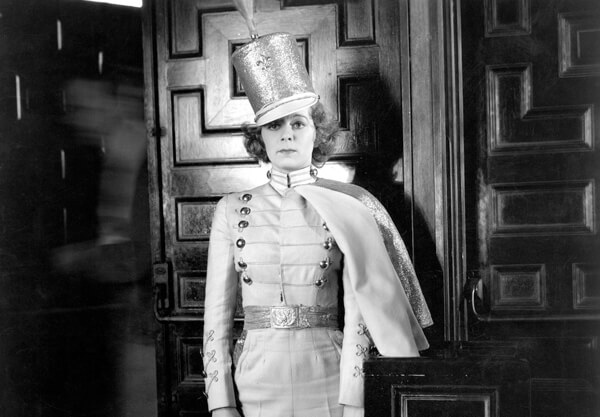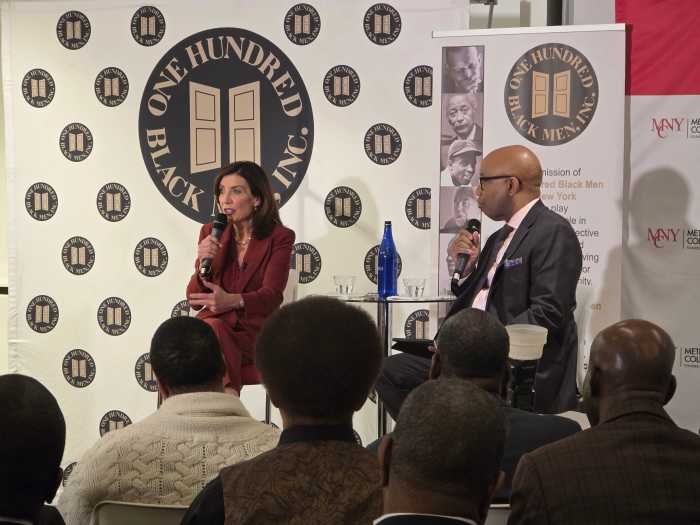Nellie McKay at Vegetarian’s Paradise 2. | DAVID NOH
Hallelujah! The ever-surprising and original Nellie McKay has a new CD out of songs from the 1960s, “My Weekly Reader.” In addition to a melting version of the Beatles’ “If I Fell,” she sings works by Country Joe, Moby Grape, Frank Zappa, Richard Fariña, Crosby, Stills & Nash, and the Kinks, what she refers to as “weapons of mass distraction.”
“I just wanted to go back in time and we did,” she told me over dinner at Vegetarian’s Paradise 2 in the West Village. “I don’t quite know where they all fell on the Hit Parade. I think back then it was easier to get on the radio. Some of them definitely wouldn’t be on the Hit Parade today. We have two Alan Price songs from the 1970s.
“It’s a small miracle that I have all these wonderful studio players from Los Angeles on the album, who have played with people like Keith Richards and John Lennon. They go on the road with me and my New Yorkfellas, and we all know each other a little too well.
“Weekly Reader” from McKay; stellar Sturges
“Although I don’t know Frank Zappa’s music that well, I gather he was a complicated person and I’m singing ‘Hungry Freaks, Daddy.’ My mother first heard that in the 1960s, in the background when she was applying for a job with a buttoned-down type guy with his All-American wife and kids. She thought, ‘How perfect.’ Zappa’s son Dweezil plays guitar on that track. We were recording in the studio that Dweezil had blocked out for eight months so we were fortunate to get in there that day, and he volunteered his time and sounds great. I think he knows the song pretty well [laughs], mother’s milk, so to speak. He’s good.
“Béla Fleck plays on ‘Murder in My Heart for the Judge.’ He came in sight unseen and just tried out all kinds of stuff. And everything he played was perfect of, of course. So that was lovely, what a nice surprise. The song is from Moby Grape and is of course so topical because just around the time we were recording it there were those two non-indictments in a row. It’s the kind of song you can just keep adding things to because there’s always some new injustice, it’s still relevant, unfortunately.”
Asked if she had a favorite on the album, her answer was typical Nellie — equal parts frustrating and adorable: “No, I couldn’t pick one out of all of them. I wouldn’t want to make any of them feel bad. But ‘Itchy Koo Park’ just makes me so happy. Let go of your cares. That’s what the world needs. Everyone is so grounded in reality. Even when you go on vacation, they’re always checking in. Everyone has accepted not just capitalism but careerism as a way of life, and that’s very depressing. I think now there’s such cynicism that there’s this feeling that we’ve looked at the 1960s and decided that was a utopian fantasy, but surely what we’re living now is a bubble that’s about to burst.
“If I had a child and he asked me for a Smartphone, I’d say, ‘Wouldn’t you prefer a drink, instead?’ It’s an addiction that gets inside your head, heart, and soul, it’s not just physical. With so much corporate malfeasance, we are living in a surveillance state. The government can hear everything we talk about because I have my phone on and I imagine yours is somewhere around. They can hear when you go to the bathroom — the government tracks us.
“Look around us. There are four cameras in this restaurant above us. What possible kind of theft or violence could happen here? I don’t think it’s just an insurance issue. I’m a woman and therefore much more likely to be attacked than a guy. But I hate the cameras — we have to live with risk. It’s like when people see bears in their neighborhood — kill them! There’s no acceptance of risk.”
What I’ve always loved about McKay is that she has always been political but never in a bludgeoning way: “Well, not until this article [laughs]. We have a thing on this album for the group stoppornculture.org. It mostly deals with hetero porn because that mirrors more the unbelievable inequality in society. It’s hard to see, in say New York City, but women are more than half the population and something like 70 percent of the work force but only own one percent of the property.
“What really concerns me about the porn industry is that it’s predatory and targets 12-17-year-old boys — now they’re even 11. They want to hook them young so they have a customer for life. It’s not about freedom of expression. It’s big business, but they’re teaching hate and this has become not only their primary means of sex but the most powerful by far, because those messages are being sent to the brain via the penis and the penis is a very powerful receiver.
“What worries me is that it drains boys and men of empathy, and that defeats everything we work toward. The internet makes it affordable, accessible, and anonymous. Gonzo, the most trafficked site, is so violent and hate-filled. I’ve always been let people do their thing, but we’re talking about an industry.
“You might say, well, if people sign a contract and agree to something then everything should be all right. But people would work for less than minimum wage if we didn’t have laws, would accept all kinds of jobs. In state fairs in the 1920s and 30s, it was popular to put a black man in a batting cage and throw baseballs at his head, the idea being that they have hard heads. He agreed to that in theory and got paid. But how much of that was cultural and economic? And it’s not okay. Sensitivity and kindness can be taught just like violence and hate.
“There’s this social construct of masculinity and that makes for a lot of bad in this world when you have an industry and culture that supports it. Porn is a distasteful subject and that’s how they managed to highjack that culture and turn something that should be very dear to us into a commodity. Look at what the media does to us. If every black person is being seen as a criminal, or Arab a terrorist, then every woman is being seen by most of these men as any number of epithets. Does that not have an effect? No, I did not see or read ‘50 Shades of Grey.’ Should I? [Laughs] I’d rather just talk to you. There was this campaign ‘50 Dollars Not 50 Shades,’ giving it to a woman’s shelter, so I did that.”
Many, myself included, have wondered about McKay’s sexual orientation, so I came right out and asked if she was gay. “Oh, no. As Brett Butler said, ‘I’m not buff enough to be gay.’ She also had a line, ‘I look like a lesbian art teacher from Santa Fe,’ and I feel like that, too.”
I told McKay that this news will disappoint a number of lesbians I know, especially after her brilliant portrayal of Billy Tipton, the jazzwoman who led her life as a man: “Oh, I don’t wanna hurt anybody. You can say I said it ‘with a twinkle in my eye.’ But that orientation thing, that could change… one can hope.”
McKay’s not in a relationship: “It’s not even because of my career. When you have a dog and even when you hire someone to look after her when you’re on the road, I feel very responsible for her. I just got back and she watches me leave — like ‘where are you going?’ — and I’m not even going out for most of the day. She wants me there, emotionally. How most people cope with a human kid, but she is very needy. It’s ‘Anna Karenina’: you have to choose between your child and your man and I can’t do what she did. Not anymore. Knock wood.”
McKay just got back from doing the “Prairie Home Companion” Cruise of the Caribbean “where I sang ‘Wooden Ships.’ It was delightful, so lovely. Eighteen hundred NPR listeners trapped together on one vessel. But everyone has their own take on things. NPR listeners are like cats. My mother read that and she said, ‘Yeah, free thinkers.’ People with more fascist leanings tend to have dogs, yes-men.
“I performed every night. Garrison [Keillor] whipped us into submission with his cold, hardened Lutheran charm. We didn’t get any sleep on this cruise, and I didn’t even get to take the free steel drum lessons that were offered. Always rehearsing, then two shows in a row to divide up the ship and you’ve got to get into the ocean some time. I sound like a Kardashian. I don’t mean to complain. I only have a shower in my apartment now, so, even while I was performing, all I could think about was taking a nice bath, nothing about the show at all.”
For me, McKay is the ultimate artist, completely unbought by any vested interests and uncompromising in her work, which can be as triumphant as her shows about convicted murderer Barbara Graham and Tipton or it can be puzzling, as a recent Café Carlyle gig where she seemingly posited herself as the oldest chorine in the world, complete with cane. Some bewildered patrons, unfamiliar with her eccentricity, were whispering “How old is she?” and even grumbling.
“I love resistance,” McKay said. “It’s my favorite audience. You get to tussle with them, like Bill Maher who enjoys playing the Red States. It’s a challenge. I think the New York and LA city slicker audiences are the toughest. David, you seem very rare in that you feel like you’re flesh and blood, but most people are just jaded professionals, and they get very phony in that, because they’re so worried about alienating people who could help them. They become calcified.”
McKay is a devotee of the blog “Jeremiah’s Vanishing New York”: “He talks about ‘yunnies’ — the young with money who have taken over this city. My Mom and I call them FUNGHI: Fucked Up Narcissistic Greedy Horrible Idiots.”
McKay appears at 54 below April 13-18 (254 W. 54th St.; 54below.com/artist/nellie-mckay).
Margaret Sullavan in William Wyler’s “The Good Fair,” with a script by Preston Sturges. | FILM FORUM VIA PHOTOFEST
On April 10-23, Film Forum is gloriously paying tribute to one of cinema’s greatest and possibly funniest auteurs, Preston Sturges. This director wrote some of the best scripts of the 1930s before being given his chance to direct in 1939 at Paramount where, for about five years, he flourished with a series of brilliant films dissecting American culture, mores, and politics. Then, he crashed and burned due to commercial failures that followed his early successes, vicious studio politics, and his own profligate drinking and spending.
His acclaimed classics — ”The Lady Eve,” “Miracle of Morgan’s Creek,” “Hail the Conquering Hero,” and my favorite, the chic “The Palm Beach Story,” are being screened, but a few he scripted are rarer and definitely should not be missed for the very special Sturges magic that propels them.
The April 14 offering is a very compelling double and if you have a special someone you want to impress with your good taste and romantic flair, by all means grab ‘em and go! “The Good Fairy”(1935), from a play by Ferenc Molnar in which Helen Hayes starred, is enchanting. It is scripted by Sturges, directed by William Wyler, and stars Margaret Sullavan — you can’t get credits better than these. Sullavan plays an orphaned waif magically granted the power — by Frank Morgan’s horny millionaire — to enrich any slob in Budapest, and she picks impoverished lawyer (and master farceur) Herbert Marshall. Husky-voiced Sullavan pretty much sets the template here for Jean Arthur, Luise Rainer, Dorothy McGuire, Audrey Hepburn, Diane Keaton, Julia Roberts, Audrey Tatou, and any other actress whoever tried to essay gamine witchcraft. And nobody did wide-eyed, irresistibly maddening innocence better. You just want to eat her up, as she coos over her “foxine,” a piece of ratty rabbit she’s convinced is more precious than sable. The movie within a movie which she ushers — an absurdly high-toned adultery melodrama — is worth the price of admission.
The magnificently tragic Sylvia Sidney never caught a break in her 1930s tenement dramas, so “Thirty Day Princess” (1934) is an utterly disarming display of her considerable comic gifts in a dual role. She plays a Ruritanian princess (with a fab wardrobe, by Howard Greer, who knew what to do with her big tits, unlike her usual Paramount designer Travis Banton, whom Sidney once told me, hated them) on the loose in Manhattan. She also plays the commoner who gets the chance to impersonate her, with the most captivatingly twinkly smile, all the more so for being rare in her tear-strewn career. It’s by the far the best of all the many royal-on-the-run films, including “Roman Holiday.” The film also features Cary Grant, super handsome and debonair here, but not quite the matchless comedian he would become two years later in “Sylvia Scarlett.” (209 W. Houston St.; filmforum.org).


































